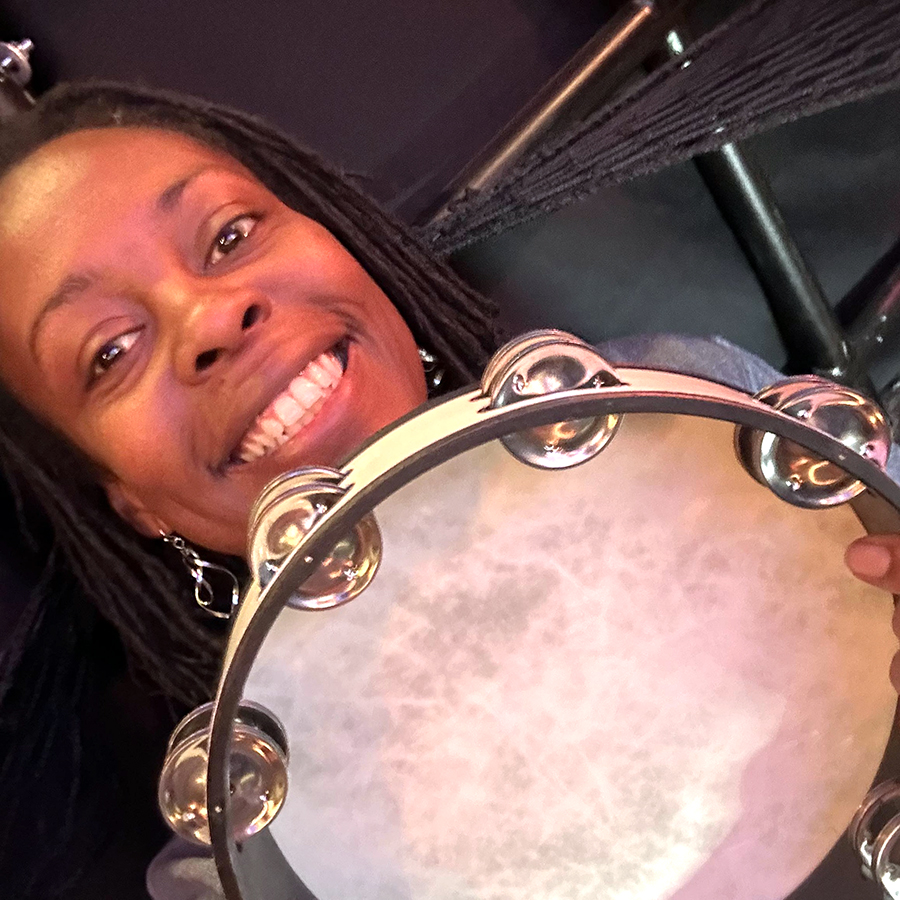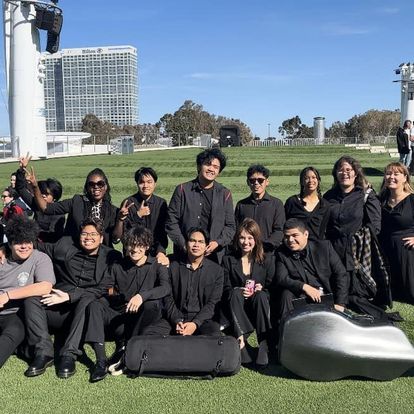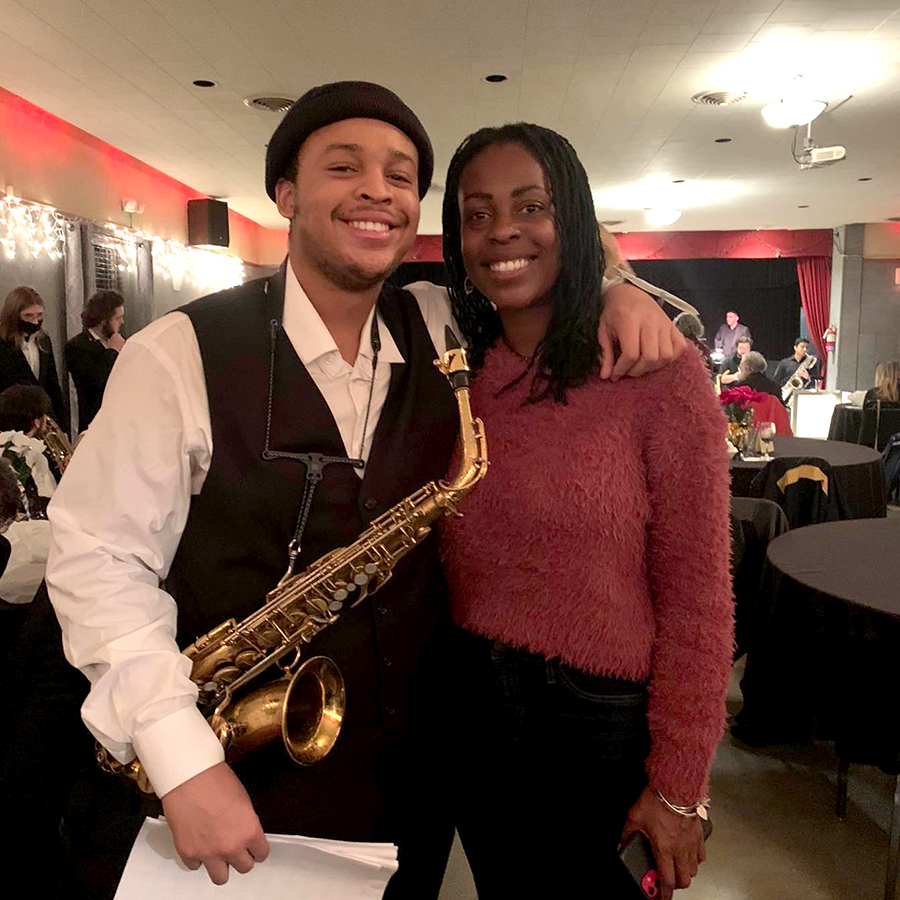Featured Stories
Tamara Paige and the Joy of Teaching Music
Author’s Note: I’ve taught music in San Diego-area schools since 2010. In honor of Teacher Appreciation Week (May 8–12, 2023), I interviewed a colleague whom I hold in the highest regard: Tamara Hartfield Paige. She directs the orchestra at the San Diego School of Creative and Performing Arts (SCPA), a position she held from 2001–2012 and returned to in 2018. She also taught at Francis Parker School from 2012–2016 and Our Lady of Peace from 2016–2018. I worked with Ms. Paige at Francis Parker School, where I observed first-hand her knowledge, creativity, and enthusiasm as an educator. How has this teacher inspired so many students to earn top ratings at local festivals, pursue music professionally, and become teachers themselves—all while raising a musical son? Read on to find out.
San Diego Troubadour: What inspired you to go into teaching music?

Tamara Paige
Tamara Paige: Well, to go into playing music, it was definitely my dad, Anderson Alfonso Hartfield Jr., who was a musician himself. He exposed me to a lot of awesome music from the ’70s that I still keep with me to this day. At that time, I wanted to play the saxophone, but it was too expensive to rent. The violin was only like $15 a month, so I chose the violin. But I found out that was [my dad’s] first instrument before he played the guitar, so he was always really supportive. And my mom grew up singing in church choir and stuff like that. She was also really supportive early in elementary school.
But it wasn’t until I got to seventh grade, and I had this band director. His name was Gary Witham, and he was the coolest dude ever. We called him Mr. Rhythm, because Witham and Rhythm sound the same. He had a pretty successful career, professionally playing with a band called Gary Puckett and the Union Gap, so he used to play the old records and talk about being on tour. He nicknamed me Tammy Cool. I remember in middle school very early on, like around seventh grade, that I already knew I wanted to be a music teacher, because I wanted to be like Mr. Witham. I [also] was playing trumpet, and I just loved it. Rodney Drew, my trumpet teacher, taught me to love jazz.
And then after that, I went on to high school where I had some amazing music mentors. I learned that Gary Witham, Eric Mabery, and Michael Luzak were the trifecta, but Michael Luzak and Gary were teaching back when Eric Mabery was in middle and high school. They were his teachers. So, it was a generational support system of music educators. I knew then that I wanted to do this, too, because this is a lot of fun.
SDT: What would you say is the best part of your job?
TP: I think the best parts of my job are the relationships that you build and maintain with people. I’ve been teaching now for a long time, and there’s a lot of people that you come across in this profession that impact your life even more than you impact theirs. It extends way beyond just their senior year and after they graduate. They remain with you forever, and I have people like that in my life that I would not have known if it weren’t for being a teacher. So, I think it’s the power of the relationships that you can build with people, and knowing the impact that I’ve had on them or that they have on me is equally powerful.
SDT: You were talking about the lineage of teachers that you came from, and I know that you have had some students go on to be professional musicians as well as music educators. I’m thinking of Chaz Cabrera (who’s with you at SCPA now), Hiram Garza, David Morales Boroff, and I’m sure there are others.
TP: There are so many. I feel old now, but I have people who have successful careers even in LA—[like] Paul Grant, an orchestra educator. Here in town, there’s always someone popping up who’s directing a musical or writing something, and they’re my former students somewhere down the line.
SDT: Do you have any advice for people who want to go into music education?
TP: Well, number one, you can’t look at it as a job. It has to be a real passion. And you absolutely have to love kids—like, you just have to have patience. You need to maintain a level of professionalism. And if you’re going into education and school systems, you also need to know how to navigate those inner workings of a public school system, which does come with limitations. So yeah, I’d say my number one advice to people who want to be teachers or music teachers is that you really have to love what you’re doing, and you have to have that patience.
SDT: I remember my first Tamara Paige concert was the Halloween concert at Francis Parker. It wasn’t just the orchestra playing; all the windows were blacked out. There were fog machines, spiders, and costumes…it was an event! Tell me about your philosophy of putting on these shows.
TP: That came out of my love of holidays and Halloween and having themes and doing things that are not expected at your typical orchestra concert. Oftentimes, those creative ideas come from the kids I’m working with; I’ll give them the leeway to create something.
I did something like that at an SCPA holiday concert, too. There’s a scene from Mean Girls where they’re singing a song in their little Santa outfits. First, the kids just learned the song. Then it turned into, “How can we make this more theatrical and funny? How can we entertain?” With that one, that surprise was our principal. He was totally game to do this, but we had a little extra Santa skirt for him. And they went and grabbed him out of the audience, and they pinned it on to him—he didn’t have to put the whole skirt on—and he came up and did the little routine with the kids on stage. My philosophy is: it’s about entertaining the audience, and I always like to add some kind of element of fun surprise.
SDT: At SCPA, I know your students just got done playing at the Rady Shell and got a superior rating at the Olympian High School Festival; tell me more about the music program there.
TP: As you know, SCPA is a six through 12 school, so students come into the sixth grade. And I’m starting to feel now—especially after coming back after COVID—that we as a department look at all of the music students as our babies. We’re there to nurture and support them, wherever they choose to go.

Tamara and her students at the Rady Shell.
[SCPA is] a place that’s really focused on giving kids as many opportunities as we can to grow, to collaborate, and to work with industry professionals. We just had [classical violin soloist] Midori visit the school yesterday—THE Midori! It was so inspirational, I actually cried—partially because I love Midori, and I was fangirling a little bit, but also because I saw how impactful that was to my kids. You could see they were on the edge of their seat over this woman talking about careers in music, and it just made me think, “Okay, I’m doing something right,” because these kids care—they really care!
Our goal is to expose these kids to many different types of musical opportunities, experiences, and performances so that they are prepared, should they choose to pursue this beyond high school. And we’re having a really good success rate since I’ve been back. I’ve seen many students go off to conservatories. We have three or four that have gone to Juilliard. One is there now on a scholarship and another one was recently accepted.
SDT: Wow!
TP: Right? They’re going off to other conservatories—the Manhattan School of Music, NYU—you name it, they’re everywhere! So yeah, I guess we can brag about that, too. We not only say we’re here to prepare you for college, but we really are preparing these kids, and they are choosing to continue with it.
I’ll say one other thing, too—I want to mention my son…
SDT: I was gonna ask about your son, Alvin Paige…

Paige with her son, Alvin.
TP: He also went to SCPA, you know. I had already sent [Alvin] there for the jazz program; John Reynolds took over after I left, and the jazz program was hot—like they were doing a lot of great things. So [Alvin] went there, and he was doing so well, and then that helped to draw me back to the school so I could be closer to him. He’s another one of the success stories of SCPA; he left and now is on a full scholarship as a second-year jazz major at Michigan State.
SDT: I was going to ask about how your career had impacted him, though I think it’s pretty clear…
TP: Well, he was in my belly, and I was conducting 42nd Street. He didn’t really have a choice! He was always at my rehearsals and down in the pit and on stage, and the kids just adopted him like a little brother. They’re all in their late 20s, and they still look after Alvin after all these years. Being in that SCPA environment was like home for him. He was always there.
SDT: He’s a saxophonist, right?
TP: Yes.
SDT: He plays guitar, too, I seem to recall.
TP: He does, yeah. He doesn’t play it as much anymore, but he was always playing sax with Gilbert Castellanos and the Young Lions.
SDT: You also do a lot of music directing.
TP: Yes, I do a lot of things. I teach at SCPA. I also am a conductor for the concert orchestra for San Diego Youth Symphony. I work with a 75-piece orchestra of kids ages 10 to 17 every Saturday, and I also do musical directing and conduct a professional orchestra for Moonlight Theater up in Vista. So, I did Cinderella with them last year as my first time, and then they’ve called me back to do their youth production of Mary Poppins, and then this summer I’m going to be musically directing and conducting the orchestra for The Wedding Singer. It is going to be sick!
SDT: And are there any upcoming SCPA performances that people might want to check out?
TP: Yes, we have our orchestra showcase on May 24 at 4pm. It’s free to the public. And that’s where I’m gonna have the surprise…that’s the concert! I can’t say what it is, but it should be wild.
SDT: Oh, my goodness…
TP: Yeah, if that’s not motivation to attend, I don’t know what is!
This interview has been edited for length and clarity.










